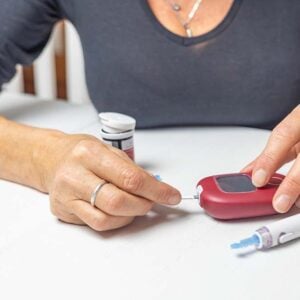
Let’s Talk Testosterone
Testosterone.
It’s the hormone most men worry about at some point.
When it’s working as it should, everything is great. But what happens when this hormonal maestro plays a few wrong notes?
Because the fact is, low testosterone (low T) isn’t just a blow to your manliness… it’s a potential life-altering roadblock.
Let’s cut to the chase.
Low T is more than just a punch to the ego. Studies show that men with low T are headed towards a higher risk of cardiovascular events, coronary artery disease, and a slew of artery-related problems.
And it’s not just about the heart—low T also skyrockets insulin resistance, metabolic syndrome, and the menacing type II diabetes, all of which are notorious cardiovascular troublemakers.
To add fuel to the fire, low testosterone has a nasty habit of accelerating the aging process, making it feel like fast-forwarding through the years on a well-worn vinyl record.
Now, when presented with low T, many mainstream doctors turn toward testosterone replacement therapy, which has been the go-to fix for decades.
Some studies claim that bringing low testosterone back to normal levels could be the solution for sexual issues and a shield against serious heart risks.
But other studies suggest testosterone therapy might be a double-edged sword, potentially increasing the risk of heart attacks and strokes.
It’s a rollercoaster of conflicting evidence that left the FDA scratching their heads in 2015. And while they didn’t yank the therapy off the market, they instead slapped a warning label on it and ordered a grand trial to settle the score.
Fast forward to the TRAVERSE study, involving 5,200 men aged 45 to 80, who were given either testosterone transdermal gel or a placebo. The findings, published in the New England Journal of Medicine, brought a sigh of relief—testosterone therapy didn’t spike mortality, heart attacks, or strokes.
However, they did note slight increases in atrial fibrillation, acute kidney injury, and pulmonary embolism in the treatment group.
So, here’s my take: testosterone therapy isn’t for everyone.
Men with an increased risk of cardiovascular disease should weigh the benefits against the slight risks, especially if they have a history of atrial fibrillation, kidney woes, or blood clots.
If your testosterone levels are low, I recommend setting your circadian rhythm daily with sun exposure at sunrise and intermittent sun exposure during the day.
If your testosterone levels are STILL low, talk to your doctor to see if testosterone therapy might be right for you.
There are three factors to keep in mind if you’re considering testosterone therapy:
- Get your testosterone tested in the morning (around 8:00a.m.) when it’s the highest. Every doctor is supposed to do this, but some T-clinics test in the afternoon to fit in more patients. You’ll want to aim for morning testosterone levels of 300-900 ng/dL.
- Use testosterone daily in the morning, when the hormone is naturally higher.
- Get afternoon sunlight to facilitate the natural breakdown of T later in the day.
P.S. From age 30 on, your testosterone levels drop by around one percent every year. Click HERE to discover four foods that can help FIX low T.
Source:
“FDA Drug Safety Communication: FDA cautions about using testosterone products for low testosterone due to aging; requires labeling change to inform of possible increased risk of heart attack and stroke with use.” U.S. Food & Drug Administration, Drug Safety and Availability, 2.26.18, fda. gov
Written By Dr. Richard Gerhauser, M.D.
For years he’s been the trusted doctor for celebrities, world-class athletes, and countless seniors looking to reclaim their health.
And now…for the first time ever… he’s making his medical breakthroughs available to readers all across America.
Dr. Richard Gerhauser, M.D. is one of the most pioneering and innovative minds in medicine today – and he delivers cutting-edge cures each month through his Natural Health Response newsletter.
Natural Health Response readers get full access to Dr. Gerhauser’s protocols for chronic pain… heart disease… diabetes… Alzheimer’s… and even cancer. These are the very same treatments Dr. Gerhauser recommends to his own patients at his practice in Tucson, Arizona.
In addition to being a board-certified medical doctor, Dr. Gerhauser has earned two master’s degrees and has served as a clinical professor at the University of Arizona.
And as a physician at the world-famous Canyon Ranch, Dr. Gerhauser treated celebrities from around the world who paid dearly for the type of next-generation health information he provides Natural Health Response readers each month.
View More Free Articles
FDA Declares Popular Decongestant USELESS
If you’ve ever turned to over-the-counter (OTC) cold meds for relief from a stuffy nose, well this news may surprise you… The FDA is proposing a ban on oral phenylephrine, the ingredient in many popular decongestants. Why? Because it doesn’t work. Despite being the main decongestant ingredient in OTC brands like Sudafed PE, Tylenol Cold […]
5 Ways to “Beat the Bloat” This Thanksgiving
As we prepare for Thanksgiving week, there’s a lot to look forward to and be thankful for. Family gatherings, football games, great food, and even better desserts top the list. Then there are all the leftovers. It’s not a holiday that’s known for moderation. But if you’re not careful, overdoing it on Thanksgiving could leave […]
Eat THIS to Reduce Your Risk of 14 Cancers
I’m a meat-and-potatoes guy. I’ll never turn down a big, juicy steak. But even more than that… I’m a fish guy. There’s not much I like more than a perfectly grilled salmon. I hope you do, too, because salmon contains two potent nutrients tied to a reduced risk of 14 types of cancer. Omega-3s are […]
The Bad Habit Robbing YEARS from Your Life
I often get eye-rolls when I stress just how essential lifestyle factors like light reducing pollution and grounding are good for health. But new research continually proves that I’ve been right all along. Today, a critical new study shows that something I’ve warned you about for YEARS is tied to a 34 percent increased risk […]
Reduce Colon Cancer Risk by 30%
More than 150,000 people are diagnosed with colorectal cancer yearly. Another 35,000 will get a liver cancer diagnosis. But if you have type 2 diabetes, your risk of developing one of these skyrockets—a 47 percent increased risk of colorectal cancer, and a two to three times higher risk of liver cancer. That’s why I’m excited […]
“Dinner Plate” Danger Raises Prostate Risk
Did you know that prostate cancer is FAR more prevalent in developed parts of the world than in less developed regions? Strange right? What is it about our modern, developed society that’s attacking our male population? There are MANY answers to this question. The primary one I will focus on today is a significant environmental […]
The 5-Minute Solution to Better Blood Pressure
Are you one of the millions who battle the so-called “silent killer” hypertension? And do you have five minutes to spare daily? If so, you could be well on your way to significantly healthier blood pressure. Sound too good to be true? A new study proves it. And the best part? It’s incredibly easy If […]
“Eye-Opening” Benefits of Pistachios
Imagine if there were a daily snack that could protect your vision. Well, a recent study brings good news for the 20 million U.S. adults already battling macular degeneration—the leading cause of vision loss for those over 60. Adding a handful of pistachios to your diet might help shield your eyesight. Let’s take a “look.” […]
Get Better Blood Sugar This Holiday Season
Let’s face it. The holidays are NOT good for your waistline… or your blood sugar levels. Potlucks, family dinners, cookie exchanges, Christmas parties… you know the drill. So, if you’re one of the 98 million people on the brink of type 2 diabetes, it’s VITAL to take steps to manage your blood sugar levels as […]
Common Vitamin Is a Hidden Colon Cancer Shield
With aggressive colon cancer on the rise in younger people, I’m always on the lookout for research showing how we can all lower our risks. Over the past few months, I’ve shared studies showing that stress, oral bacteria, obesity, and circadian disruption are all tied to colon cancer. And just last week I revealed how […]










